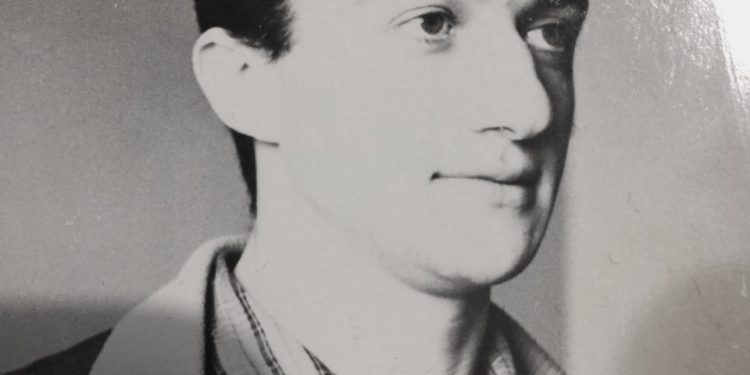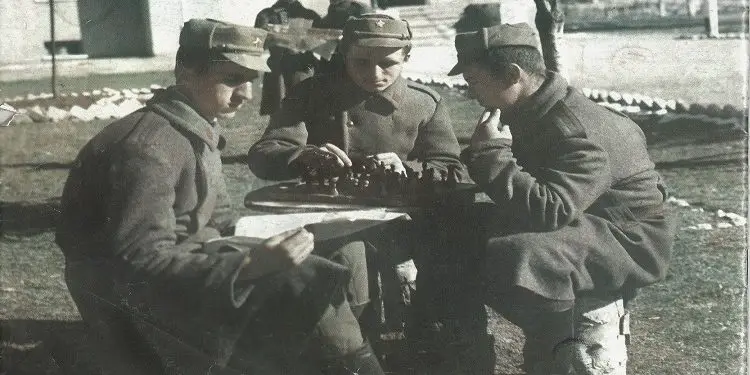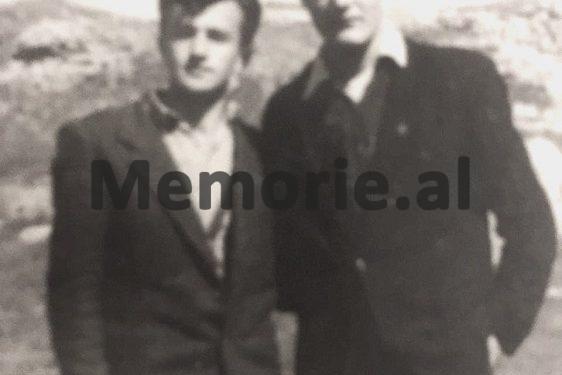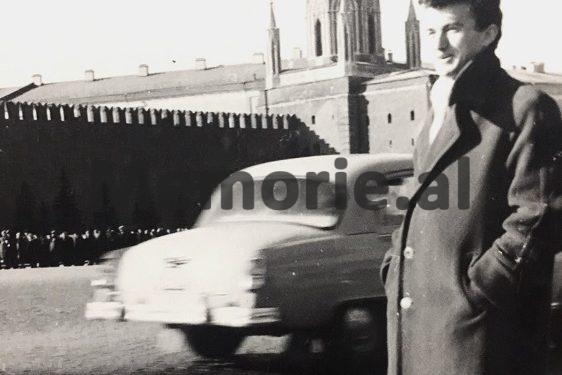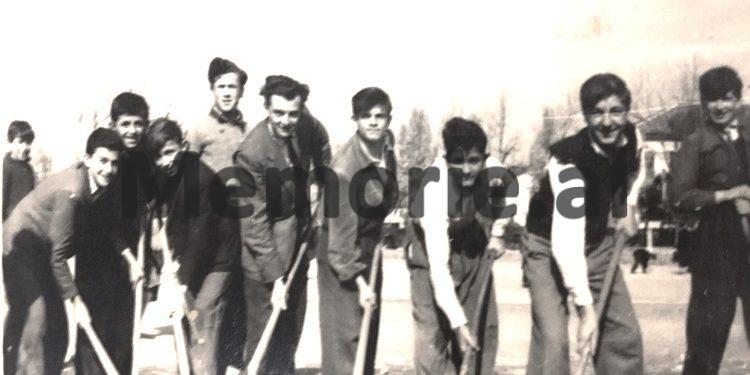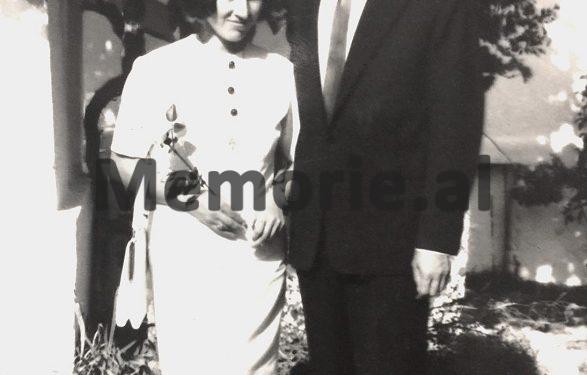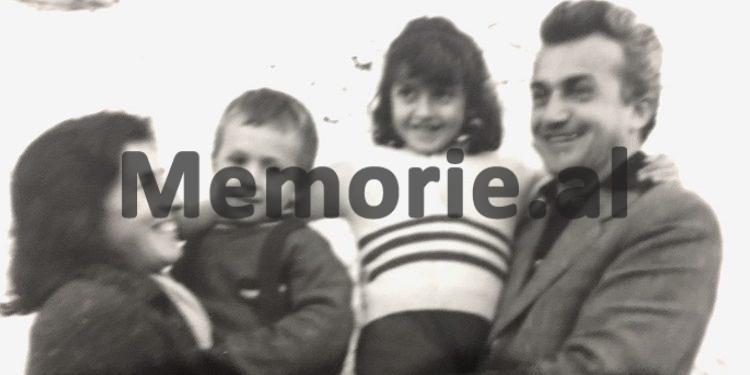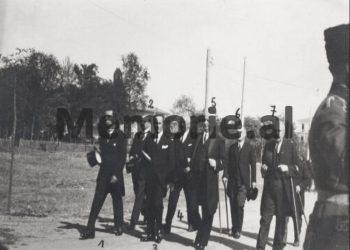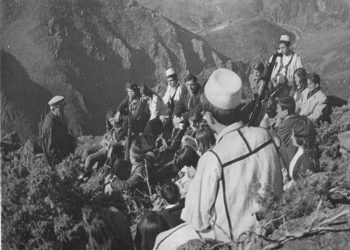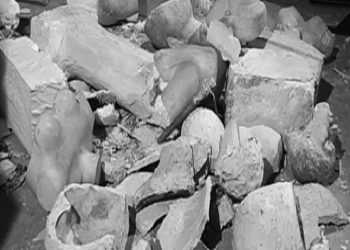By Sokrat Shyti
Part fifty-one
Memorie.al / Writer Sokrat Shyti is the “great unknown” who for several years has shown the tip of the iceberg of his literary creativity. I say this based on the small number of his books published in recent years and mainly the voluminous novel “Ghost Night” (Tirana 2014). The novels: “BEYOND MYSTERY”, “BETWEEN TEMPTATION AND THE Whirlwind”, “THE CORROSION OF NIGHTMARE”, “THE SHADOW OF SHAME AND DEATH”, “THE CHIEF COLONEL”, “THE BROKEN HOPES”, “THE CONTROVERSIES OF FATE” I, II, “SURVIVAL IN THE COW’S CABIN”, as well as other works, all novels, with 350 – 550 pages, are in manuscript form waiting to be published. The dreams and initial momentum of the young novelist, who returned from studying abroad full of energy and love for art and literature, were cut short early on by the cruel blade of the communist dictatorship.
Who is Sokrat Shyti?
Returning from his studies at Moscow State University, immediately after the break in Albanian-Soviet relations in 1960, Sokrat Shyti works at Radio-diffusion (which was then located on Kavaja Street), in an editorial office with his journalist friends – Vangjel Lezho and Fadil Kokomani – both of whom were later arrested and later shot by the communist regime. In addition to radio, the 21-year-old Sokrat, if we imagine him, had passionate literary interests at the time. He wrote his first novel “Madam Doctor” and was on the verge of publication, but… alas! Immediately after the arrest of his friends, as if to top it off, his painter brother fled abroad.
Socrates was arrested in September 1963, and in November of that year, he and his family were interned (with his mother and younger sister) in a place between Ardenica and Kolonja e Lushnja. For 27 years, the family lived in a cowshed with reeds, without windows, while Socrates was subjected to forced labor. Throughout the 27 years, he was legally forced to appear three times a day, to the local governor. He had no right to move from the place of internment, he was deprived of any kind of document, etc. In these conditions, in the middle of a cowshed, he gave birth to and raised his children. It was precisely on this event, or rather a very long history of persecution, that he based his book “Survival in the Cowshed”!
Agron Tufa
Continued from the previous issue
PART FROM THE BOOK, “SURVIVAL IN THE COW’S SHED”
– “The angel told me that you were a student in Moscow! – the second lieutenant suddenly spoke, casting a curious look. – You are a genius, you have seen the world with your own eyes!…What branch did you study”?
– “Chemistry-physics, a new subject, given to chemical engineering students in the fourth and fifth years”, – I explained.
– “Then you must have worked as a journalist on the Radio for scientific programs, such as the Radio Encyclopedia”, – he added to show that he followed the entire program of Radio Tirana with great attention, but he especially liked the literary and scientific programs.
– “I collaborated with the literary programs. But mainly I prepared the youth program. In the meantime, I wrote stories and fairy tales for pioneers,” I explained.
– “Variety and interesting work”! – said the lieutenant.
– “Literature has always attracted me and I like it”!
– he emphasized.
– “Did you choose the United Military School yourself, when you graduated from high school, or was there only a study right for this branch in your district”? – I asked.
– “According to the new planning, only one child in each family was given the right to study at institutes or universities. This study right went to my older brother. When I was still a student in the fourth grade of elementary school, a scholarship came to our village for us to the military school ‘Skënderbej’, and the chairman of the people’s council told my father to take me from the fifth grade. My father was delighted, and he called it a privilege to see me dressed in the beautiful new military uniform, with those wide trousers, like a junior general! So my life direction was determined from then on”, he emphasized with some hesitation, to point out that I had no other choice.
– “What if you had continued all the links of education normally, and were given the opportunity of higher education, which branch would you have expressed your desire for”? – I asked him.
– “Or I would continue with correspondence language – literature, or history – geography, he replied. – I like the profession of teacher”!
– In the United Military School is there a special branch for the leading officers of the NBUs? Or is the division of branches done according to the needs of the Ministry of Defense”? – I asked him to keep the topic of conversation within his field, so that he wouldn’t be curious about me, how I left Radio, why I was transferred to Lushnje, and why I became a soldier in the labor department, questions that would make it difficult for me to explain.
– “The NBUs were recently created as an auxiliary economy for the military departments. The basic food for the army is produced here: beans, potatoes, onions, all vegetables. Since the state owns a lot of land, which is not located near residential centers, and in fact remains uncultivated wastelands, it was considered reasonable not to leave this wonderful wealth unused!
The solution was found through military farms, or NBU for short. A wonderful and perfect solution, considering that many new recruits are farmers and shepherds, connoisseurs of agricultural and livestock processes, and they gladly perform this type of service. You will see for yourself. There are some of them who perform two norms…”!
– “Every work process is carried out with their hands, no agricultural mechanisms are used”? – I was interested.
– “They cannot be used due to the unsuitable mountainous terrain, with slopes that are not allowed for motorized vehicles. Therefore, the cultivation of the soil is done with their hands, only with their hands. The same goes for plowing”.
– “But how is irrigation carried out?” – I asked further.
– “In these places, such as Biza e Martanesh, Stebleva, the two main sectors of our NBU, there is no need for irrigation at all, since the ground remains covered with snow for several months of the year and remains moist during the summer period. Can you imagine that at these heights the night temperatures in summer are so low that the soldiers wear two coats on top of each other, otherwise they can’t sleep”?!…he said.
– “If I may, and it’s not a military secret, how do you deal with the influx of new recruits”? – I asked him with some trepidation.
– “They stay for two to three months in the Burrel Congress, where the NBU headquarters is located, to undergo quarantine and military training, according to the curriculum. In addition to two hours of political work, which the company commissar does every day, they are given the necessary knowledge about the automatic carbine, how to disassemble and assemble it, how to use it for long-distance shooting and hand-to-hand combat, how to hold and throw a grenade, how to put it on against gas to protect themselves from poisonous chemicals, how to crawl under barbed wire, how to cross the river with a rope.
In addition to the lessons, which begin at eight in the morning until two in the afternoon, physical training is carried out with Captain Nazifin in the afternoon: long-distance runs, from 1,500 to 50,000 meters, without stopping at all, which are controlled by a stopwatch and followed by the captain’s assistants. The runs, along with the breaking and making of the bed several times, until the time limit is met.
In addition, the sudden awakenings at night in the form of an alarm, the hardening of the body through strenuous endurance in low temperatures, completely naked, the hasty wanderings carrying sandbags on their backs, at distances of 100 and 200 meters, the reverse reporting, when they do not have the proper tone and military agility, and especially the carrying of a wounded comrade, constitute the most difficult training for new recruits.
Therefore, for most people, the two- to three-month quarantine period seems longer than the entire military service. Immediately after the quarantine, ordinary work begins. Those who are farmers and livestock keepers rub their hands with satisfaction, since they no longer feel the crushing weight of training, it seems to them as if they are back in their home town, since they are engaged in the same work processes, only they all sleep together on straw mattresses, wear military work clothes during the day, and during work they undress as they please, and even sunbathe. These people feel satisfied, because here they eat wheat bread, pilaf, and pasta, while in their villages, they are not given corn bread, and they rarely and with great desire see pasta and pilaf.
Of course, the situation changes radically for a very small minority of recruits who are willing to do their military service in the NBU, as if it were your job. With their hands not yet dead from physical labor, and their bodies not yet hardened by the hardships of training, the quarantine period and the one after it seem to you to be nothing more or less like Dante’s Inferno. But I have the impression that perhaps an exception can be made for you, of course with the approval of the director: if he likes it, he can keep you close to him, as a secretary, or appoint you responsible for culture for the entire NBU.
I have a feeling that something will be done, since there is no second case where a journalist from the Central Radio comes to our military unit to do his compulsory military service. I will certainly point out my suggestion to the company commissar that he talk to the director directly. These two are fully empowered to make decisions, and especially when their opinions coincide.
– “Comrade Commander! I thank you for presenting the complete picture of life and activity in your military unit, during the two-three-month quarantine period and continuously! You have a realistic tendency to describe the situation with convincing artistic truth! If you had the ability to put these thoughts on paper, taking into account the perspective as presented, I have no doubt that your stories would come out interesting and attractive, and would be read with pleasure”!
– “You are the second to express the same appreciation for me”!… – said the second lieutenant quite pleased.
– “But who was the first”? – I asked.
– “The literature professor at the ‘Skënderbej’ school – he emphasized with pride. – He liked my writings, so much so that he read them in front of the class. Once he expressed the surprising thought: You, Sule, can become a writer in military uniform, if you have the will and perseverance to devote yourself to literature with all your heart and soul! After this assessment, my friends called me; ‘Sule the writer’, and naturally it suited me well”.
– “I believe you must have written something during this time, after finishing school and starting your military career…”, – I said to make him happy, sensing that he felt happy, if I pointed out his wonderful ability to write. – “Since we had the opportunity to be close to each other for a long time, we are given the opportunity to exchange thoughts on literature, as well as to read your writings, which you surely keep as a treasure in your notebook”.
– “I would be very honored and appreciated to collaborate with a journalist! – he said excitedly. – Even if my wish is not fulfilled, that they keep you here as a writer, or a director of the cultural activities of the unit, for some reason, it is enough to assign you as a private in my company, to stay together as much as possible, close to each other. In fact, this way we will be closer for a long time, than if they assign you as a writer or artistic director of the unit, knowing that the duty of a writer keeps you locked in the office, while that of the head of culture, forces you to wander around with services in other sectors”.
I was reluctant to explain to him in the presence of the driver, that with the last opportunity, I would encounter a very serious obstacle, that as a private in the organic, I had to fulfill the norm of working the carpets of the land. And no matter how many different forms are used by the second lieutenant to cover the gap in my norm, one day the internal spies of the director, the commissar, the head of the sector, or the captain, will surely discover the privileges of the company commander, how he separates the former Radio journalist from the other soldiers, supposedly assigns him to work in plots far away from them, but there they actually set up a chat, for seven pairs of pleasures, then deal with some notebooks.
Unable to continue the conversation any further, I turned my gaze to him, to let him know that he should leave this discussion at that for today, and that we could discuss it further when we were alone at a suitable time. He caught my gaze and fell silent. He was glad that I had restrained myself, and I took care to restrain his mouth, considering that our acquaintance had just begun, and moreover, it was unknown what attitude the highest leaders of the NBU would have towards me, especially after reading the anonymous letters, which would surely reach the director and commissar of the military department. Even after he had said so much, the company commander went too far with his gentle attitude towards me, treating me as a privileged soldier, when he still did not know my social and societal status, that I was interned and bore the terrible nickname of the declassed!
I was rightly hesitant and afraid of the silent driver, driven by the suspicion that he might relay the conversation of Commander Sula, the director and the commissar, since these were surely the hired spies, and their duty was to report in detail.
– “Do you see that hill in front of us?” – the second lieutenant asked after a while, extending his hand. – On it are the buildings of the directorate, the head of the sector and the soldiers’ dormitory”.
– “Everywhere here, the soil is red”!… – I was impressed by the color of the soil.
– “Such are the earth formations here,” Commander Sula added. – Besides, fog often falls here”.
– “It’s like London… – I added. – They say that in the British capital, there are two hours of sunshine a day or not! Certainly annoying weather for such a large and noisy capital. But they got used to it, and they weren’t impressed.”
– “Just as you will adapt to the climate here during these two years, – said the second lieutenant with a smile. – Here we have arrived… – he added when we passed the checkpoint beam. – To avoid being noticed in the wrong way, with your uncut hair, before the unit leaders arrive, go to the barber with the driver, and turn back immediately. Be careful not to run into Captain Nazif”! – he ordered the driver.
– “Is this captain so terrible that even the officers are afraid of him”?!…- I asked the driver curiously a little further on.
– “Terrible in appearance and appearance: red-headed and scraggly, as if he had emerged from the waters of the Red Sea!…- he replied.
– “You can beat a horse’s leg, you won’t find another like Nazif’s!… All the soldiers who serve here, when they leave here, remember only those two or three months of quarantine with the captain, who takes their souls! If they let him act freely, he would make a name for himself, risking to leave the recruits breathless! Just imagine: the lightest punishment for him is when he leaves the soldiers without eating a meal…”!
– “As you described him, he should be compared to a being who calls the date of horror”! … – I said, shuddering.
– “Okay, okay, – the driver repeated. – Urgently give a car with fifth gear to this journalist’s hair, because Commander Sula is waiting for him”! – he said to the barber, as soon as we entered the door of the alcove.
– “He has come to complete his six-month sentence”? – the barber asked when he noticed the gray hair, and heard the definition; “this journalist”
– “I don’t know, so give it to me”! – the driver emphasized, looking beyond the door frame.
I felt like those sheep that are trampled underfoot to be sheared. Because after this moment, I would be a being led by a shepherd, sometimes a terrible one, like Captain Nazifi, and at other times a kind shepherd, like Commander Sula. After the zero haircut, my appearance changed so radically that it impressed even the lieutenant, and he promised me in a whisper when I approached him, that in the future he would not allow my head to be shaved, like the other soldiers.
– “It doesn’t matter here, let me be hairless. But when I get the chance to go on leave, to meet my fiancée…”!
– “These three months of quarantine, forget about the leave!” – said Commander Sula. – Be careful, the director and the commissioner are coming!”… – he added hastily, spreading out the folds of his wrinkled uniform.
And as he took three long steps, with a frozen stance, he presented the force:
– “Comrade Colonel! The recruits from the Lushnja district have arrived at our unit. We await your order for further action”!
– “Did you have any disobedience during the trip?” – asked the colonel in civilian clothes in a calm voice, a man of average height, without a belly, slightly puffed up in his face, with sharp eyes.
– “Since the receipt of the list, with the relevant documentation, the examination of each recruit, the control of each one for the absence of cold tools of harm, such as razors, knives and hard metal objects, before boarding the vehicles, were carried out according to the regulation. The commander of the first company of the Kongrazhd sector, Lieutenant Sula, reports”.
– “Okay, calm down”! – said the colonel in civilian clothes.
– “You, comrade commissar, can continue according to your program…- he added in a bored tone, as if he had said: “This damned duty has come to me! Formally, I am a major officer, when in fact I run an agricultural and livestock farm. So my comrades in various arms, throw spikes every time they meet me: ‘Well, comrade director, how are our crops and products this year? How many calves, foals and colts were added to your maternity’? And they leave with a mocking smile, without uttering a single word about the state of military preparation…”!
The sector commissar, short, with a shabby appearance, dressed in a winter military uniform, stood erect, turning to the colonel when he left with very slow steps, to go to his office, where he spent most of his time reading books and newspapers, since letters from the Ministry of Defense and Burrel’s division were quite rare, with the exception of the Prapavija sector, which requested exact figures for agricultural and livestock production, according to rumors, and gave instructions for future planning. in support of every plenum of the Party Central Committee.
– “Then, comrade commander, can you tell me if there is anything new for me this time…”, – he addressed the lieutenant with a look of Schweik.
– “This time, to your great luck, I have brought you a treasure!” – the lieutenant surprised him. – But you have to appreciate and value it…”! Memorie.al




